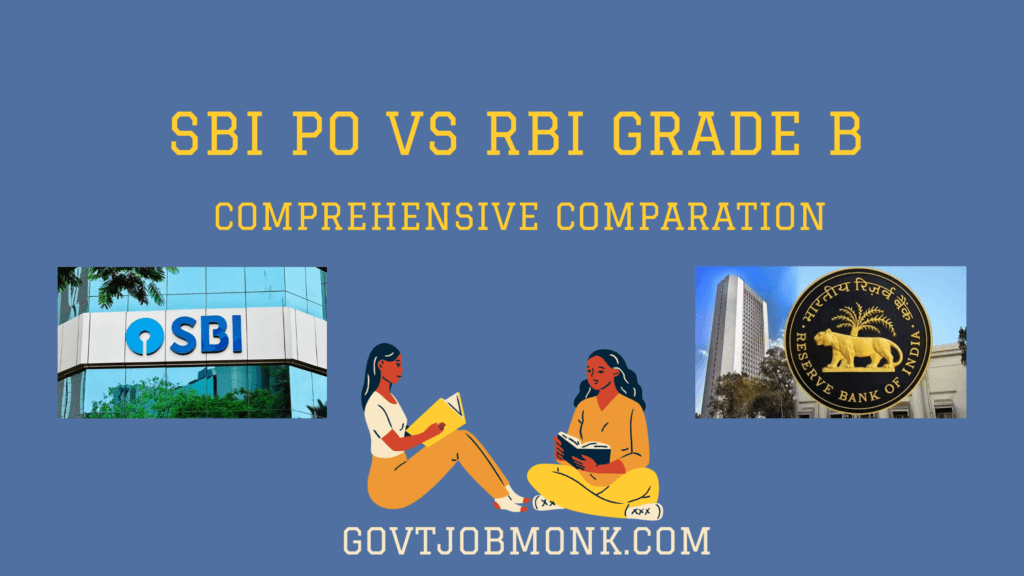SBI PO vs RBI Grade B is the ultimate question for banking aspirants. Let’s solve it with a detailed comparison of roles, perks, and growth!
When it comes to prestigious banking jobs in India, SBI PO (State Bank of India Probationary Officer) and RBI Grade B Officer are among the top choices. Both roles promise lucrative salaries, job security, and growth opportunities. However, their responsibilities, perks, and career paths differ significantly. This blog offers a detailed comparison to help you make an informed decision.

SBI PO :
The SBI PO role is an entry-level managerial position in India’s largest public-sector bank. It focuses on customer service, operations, and team management.
Key Highlights:
- Recruiting Body: State Bank of India
- Exam Conducted By: SBI
- Role: Managerial (Branch Operations and Customer Service)
- Salary: ₹8-13 LPA (including perks)
- Growth: High, with opportunities to become the bank’s top management
RBI Grade B :
The RBI Grade B Officer is a prestigious role in India’s central banking institution, focusing on policymaking, financial regulation, and economic development.
Key Highlights:
- Recruiting Body: Reserve Bank of India
- Exam Conducted By: RBI Services Board
- Role: Regulatory and Policy-making
- Salary: ₹17-20 LPA (including perks)
- Growth: Opportunities to reach top management roles like CGM or even Deputy Governor
Comparison Between SBI PO and RBI Grade B
1. Job Profile and Responsibilities
- SBI PO:
- Managing branch operations and customer relationships.
- Handling loan processing and approval.
- Ensuring compliance with banking regulations.
- Marketing bank products and services.
- RBI Grade B:
- Formulating monetary policies and regulations.
- Managing government accounts and public debt.
- Supervising and regulating banks and NBFCs.
- Conducting research on the Indian economy and financial markets.
Verdict:
SBI PO roles are operational and customer-centric, while RBI Grade B is policy-driven and regulatory-focused.
2. Selection Process
- SBI PO:
- Preliminary Exam
- Main Exam
- Group Exercise and Interview
- Final Selection (Merit-Based)
- RBI Grade B:
- Phase I (Prelims)
- Phase II (Mains)
- Interview
- Final Selection (Aggregate Marks)
Verdict:
RBI Grade B exams are more analytical and require a deeper understanding of economics and finance compared to SBI PO.
3. Work-Life Balance
- SBI PO:
- Work hours can be demanding, especially during financial year-end and peak seasons.
- Transfers to rural or semi-urban areas are common.
- RBI Grade B:
- Regular working hours (mostly 9-to-5).
- Limited public interaction and pressure.
Verdict:
RBI Grade B offers a better work-life balance compared to SBI PO.
4. Salary and Perks
- SBI PO:
- Basic Pay: ₹41,960 (with annual increments)
- Additional Perks: HRA, DA, medical, furniture allowance, and more.
- Total CTC: ₹8-13 LPA.
- RBI Grade B:
- Basic Pay: ₹55,200 (with increments)
- Additional Perks: HRA, DA, housing allowance, education allowance, and more.
- Total CTC: ₹17-20 LPA.
Verdict:
RBI Grade B offers a significantly higher salary and better perks than SBI PO.
5. Growth Opportunities
- SBI PO:
- Probationary Officers can rise to positions like Branch Manager, AGM, and eventually MD/Chairman.
- Internal exams and performance reviews drive promotions.
- RBI Grade B:
- Officers can become department heads or reach top management levels like CGM, ED, or Deputy Governor.
- Promotions depend on performance and internal exams.
Verdict:
Both roles offer exceptional growth, but RBI Grade B is more aligned with policymaking and regulatory leadership.
6. Transfer Policies
- SBI PO:
- Frequent transfers to rural, semi-urban, and urban branches.
- Transfers are part of the job rotation policy.
- RBI Grade B:
- Transfers are less frequent, typically between regional offices and headquarters.
Verdict:
RBI Grade B has more stable posting policies compared to SBI PO.
7. Work Environment
- SBI PO:
- High customer interaction.
- Sales targets and deadlines can add pressure.
- RBI Grade B:
- Professional and research-oriented.
- Limited public interaction and minimal sales pressure.
Verdict:
RBI Grade B offers a calmer and intellectually stimulating work environment.
SBI PO vs RBI Grade B: Which One Should You Choose?
| Parameter | SBI PO | RBI Grade B |
|---|---|---|
| Salary and Perks | Good | Excellent |
| Work-Life Balance | Moderate | Excellent |
| Job Stability | High | Very High |
| Career Growth | High | Very High |
| Exam Difficulty | Moderate | Tough |
| Work Environment | Customer-Centric | Policy-Oriented |
Final Thoughts:
- Opt for SBI PO if you are passionate about customer service, operational roles, and quick career growth within the banking sector.
- Choose RBI Grade B if you prefer a regulatory role, better work-life balance, and higher perks.
Official Websites:
Latest Notification
By understanding the nuances of both roles, you can align your preparation and career aspirations effectively.
Join GovtJob MONK, the ultimate social network platform for government job aspirants! Connect with like-minded individuals, discuss strategies, and stay motivated. Access the Activity Page to engage with the community, and visit our Updates Page for the latest notifications and free study material. Together, let’s achieve your dream job!